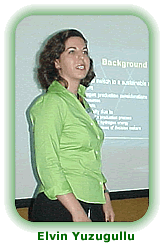In the late summer of 2004, three Environmental and Energy Management graduate students met with senior leaders of the National Renewal Energy Laboratory (NREL) to discuss on-going renewable energy projects. All of the participating students are candidates for doctoral degrees and are in various stages of their doctoral research. Participating from GW were Mike Helwig, who discussed his project on “Assisting Federal Agency Compliance with the Energy Policy Act of 1992;” Elvin Yuzugullu, who presented her project on “Hydrogen Production Alternatives: Resolving Disparities and Examining the Stability of Decision Making Amongst Divergent Stakeholders;” Laura Verduzco, who discussed her project on “Economic, Environmental and Financial Analyses of Small-Scale Distributed Hydrogen Generation Alternatives;” and E&EM lead professor Dr. Jonathan Deason.
Participating from NREL were Dr. Eldon Boes (Energy Analysis Office director); Dr. Doug Norland, Patrick Quinlan, and Mike Berlinski.
After introductions by Professor Deason, Mike Helwig led off the discussions with a presentation of his investigation into the use of tiered integer programming models to reduce use of non-renewable fuels in federal fleets. Mike, who has a B.S. degree in Nuclear Engineering Studies from the University of Illinois and an M.S. degree in Operations Research from the Naval Postgraduate School in Monterey, California, recently retired from a 20-year career as an officer in the U.S. Navy. In his last position in the navy, Mike conducted program analyses for the Chief of Naval Operations. He currently is a research analyst for the Institute for Defense Analyses.

In his research, Mike has examined twenty federal agencies to date, finding nine of them out of compliance with the Energy Policy Act of 1992 (EPAct) requirements for alternative fueled vehicle (AFV) acquisition, with large agencies tending to be less compliant than small agencies. Mike is in the process of developing a system of tiered integer optimization programs to maximize EPAct AFV credits, subject to budget constraints such as alternative fuel availability, vehicle availability, and fleet needs.

The discussion next centered on the project of Elvin Yuzugullu. Elvin has a B.S. degree in Environmental Engineering from the Yildiz Technical University in Istanbul, Turkey, and an M.S. degree in Environmental Engineering from the West Virginia University in Morgantown, WV. Elvin served as an intern at the National Renewable Energy Laboratory's Washington D.C. office from June 2002 –until August 2003.
Elvin discussed her investigation into the use of multiobjective optimization models to facilitate convergence of disparate stakeholder opinions about hydrogen production alternatives. She is using multicriteria decision-making (MCDM) tools to examine the robustness of alternatives over stakeholder utility scales, examining the capabilities of MCDM tools to facilitate convergence of disparate viewpoints, and evaluating the utility of MCDM in facilitating hydrogen production decisions.

The third presenter was Laura Verduzco. Laura holds a B.S. degree in Chemical Engineering from the Universidad Nacional Autonoma de Mexico in Mexico City, where the graduated with Honors. Laura has been a Fulbright Scholar from 2000 to the present time.
Laura us conducting an investigation into the economic, environmental and financial implications of small-scale distributed hydrogen generation alternatives. She is examining how to best determine the optimal scale of distributed hydrogen production and the optimal levels of incentives that should be put into place to encourage small-scale production facilities, using multi-aspect analyses of three major production alternatives: conventional (baseline), Home Refueling Units and Neighborhood/Community Refueling Units.
All three doctoral students plan to work with NREL officials during the course of their investigations.


